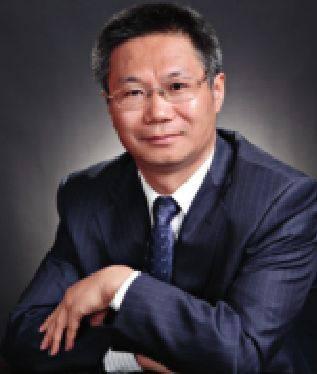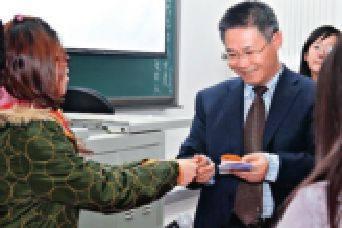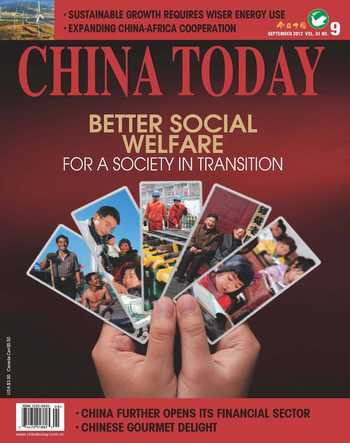On the Pulse of the National Economy
By ZHAO QIULI & SONG KUN


PROFESSOR Huang Shaoan has a natural bent for economics. Even his decision to stay at university as a teacher 20 years ago came from economic thinking, as he reasoned that, thanks to the multiplying factor of their students, the value of teachers is unlimited. Now turning to 50, he is an accomplished professor of economics with his own research team and recognized by the national Chang Jiang Scholar Program, a government incentive scheme for the countrys celebrated scholars.
A Family of teachers
The son of grade school teachers, little Huang followed his parents to the countryside during the “cultural revolution”(1966-1976), when many intellectuals were sent to work with farmers to be reeducated. He grew up in a rural environment that lacked a decent public education system, but fortunately his teacher parents took care of his learning. In 1978, the second year after the national college entrance exam was resumed, he passed the exam and became a university student. After finishing his undergraduate studies, he entered the postgraduate program with economics as his major.
The choice was not based on personal interest or academic merit but the expectation that the country would need a large reserve of economists now that the national priority was shifting from political movements to economic development. He hence took on the subject with a heartfelt sense of honor and duty. But as his studies proceeded, he became fascinated with the discipline and awed by its power to shape the world, the country and the life of every citizen.
After receiving his doctorate degree in the early 1990s, Huang didnt hesitate in his choice to stay at university and teach, though he had received many offers outside academia. He made the decision out of his love for teaching, under the influence of his family background. His grandfather was a teacher at a private school before the founding of the Peoples Republic, his parents taught at grade schools and three of his five siblings are college teachers.
Huang was hired by Shandong University and has worked there ever since.“I just followed my heart and chose teaching as my career. I think highly of the value of entrepreneurs and politicians, but I would rather use my wisdom, knowledge and personality to influence my students,” he explained. “They might become successful businessmen, politicians, civil servants or scholars. My profession is the most economically useful, isnt it?”
Moreover, university provides the environment he needed to concentrate on his research, which for him is another meaningful and valuable task on which to focus. In 1994, at the age of 32, Huang was nominated as professor, an honor rarely given to a lecturer that young.
Nearly two decades on, Huang Shaoan, now president of the School of Economics of Shandong University, is at the forefront of Chinas economic thinkers, particularly in the realms of property rights, institutional economics, economics of law and language economics. His achievements have been honored by a number of awards including the Sun Yefang Economic Science Prize and the Award for Rural Development Research.
A Pioneer in economics
When talking of Huang Shaoan, his colleagues and peers share the view that he is a farsighted scholar with solid academic background who has both the courage to brave uncharted waters and the patience to pay due attention to fine details.
While teaching at Shandong University, he became one of the first in China to study modern property rights and institutional economics. His book Guide to Property Right Economics was among the first publications in China to systematically compare economic theories prevalent in the West with Marxist economics. It presents an innovative and profound analysis of their cardinal concepts, theoretic basis, values and defects.
Observing the low efficiency of Chinas judiciary and legal system, Huang later advocated for the study of the economics of law, and mentored Chinas first doctoral student in the field. In 2003 he founded the annual China Forum on Economics of Law with professor Shi Jinchuan from Zhejiang University, which gave a huge boost to research in the country.
“Language and economics are related in several ways and thus linguistics research can be included in the study of economics. Considering both its academic and practical needs, China should increase its research into the economics of language,” says Huang Shaoan. The economics of language is an emerging field of study and has become a subordinate subject of economics in recent years. In 2004, Professor Huang established the first economics of language research institute, which was expanded into Economics of Language Research Center of Shandong University in 2011.
Besides studying basic theories, members of the faculty are coming up with original research in subjects such as how Chinas establishment of Confucius Institutes around the world promotes the Chinese language and culture, strategies for Chinas language industry and the preservation of Chinas ethnic minority languages. What is commendable is Professor Huangs ability to find topics that are worth studying and transform the results of research into practical application.
Huang Kainan, a student of Huang Shaoan and professor at Shandong University, says: “I like chatting with my teacher while choosing research topics because he has a special perspective and always comes up with topics that others overlook.”
Professor Huang Shaoans papers have received much attention, with one winning him the Sun Yefang Economic Science Prize, the highest award in the field of economic science in China. Some 20 of his papers have been published in top-notch publications in the field, such as China Social Sciences and Economic Research Journal, and his study on the reform of small and medium-sized stateowned enterprises in Zhucheng City of Shandong Province has become a classic case study of Chinas economic reform.
Professor Huangs research keeps pace with the pulse of Chinas rural and industrial reforms. His study on the rural supply and marketing cooperatives drew attention nationwide, and his paper on the transference of land-use rights under the household contract responsibility system was awarded the first China rural area development research prize. During the heat of Chinas industrial reform in the 1980s, his analysis of the relationship between the ownership, shareholding, property and enterprise systems provided theoretical explanations supporting the reform of state-owned enterprises into shareholding companies.
Huangs team
While he is active in conducting his own academic research, Huang has also shown great passion in creating a top quality academic team. Currently, the faculty Huang leads at the Shandong Universitys Center for Economic Research includes one Chang Jiang Scholar from the Ministry of Education, two outstanding foreign scholars and several fellows with national academic titles.
British research fellow Geoffrey M. Hodgson, also a world-leading figure in institutional economics, is a member of Huangs team. Hodgson indicated the Center for Economic Research at Shandong University was undoubtedly Chinas top center for studies on institutional economics, which was the main reason for his joining. He said the free academic atmosphere had impressed him.
In recent years, Huangs team has mainly engaged in studies on the fundamental theories of economics. They have accomplished impressive achievements in such fields as institutional economics, law and economics, the economics of language, theories on general equi- librium, theories on economic growth, econometrics and health economics. The team members have also been devoted to several research areas aimed at providing practical solutions for national and provincial development projects and have worked as consultants with both the government and businesses.
Guided by national strategic requirements, Huangs research center has taken on such research topics as the development of the marine economic zone on the Shandong Peninsula and the development of the high-efficiency ecological economic zone in the Yellow River Delta. Closely related to Chinas development as a whole, their research results have been studied closely by government departments. One major national research project that they are currently conducting concerns land expropriation, requisition and compensation. As the acting dean of the Center for Economic Research of Shandong University, Huang Shaoan has guided his team to pay much attention to the major issues related to the economic and social development of Shandong Province. They have provided valuable suggestions on major issues for the Shandong provincial government, based on objective and pragmatic research.
“The teams success in integrating theory with practice is inseparable from Huangs leadership. Professor Huang is one of Chinas economists renowned for their ability to apply theories to realities,” remarked Professor Wei Jian, in charge of the law and economics research in Huangs team. In fact, the ability to solve real problems can be ascribed to Huangs concern for whats going on at the grassroots level, particularly situations in rural areas, which has given him profound knowledge and understanding of Chinas realities. It has also been influenced by his insight that any major theoretical innovation in economics comes from societys strong demands for change.
As an influential economist, Huang is aware of his responsibilities. “Just one opinion or a remark given by an economist to the media can set off a ripple in society. Therefore, for an economist, social responsibility is as important as his academic ability, perhaps even more. We cant simply pander to decisionmakers preferences or popular opinion, but should stick to a scientific attitude and respect for objective laws, or calamity could hit our country and its people,”said Huang.
Huang and his team attach great importance to the quality and value of their research and maintain a pragmatic attitude to the relation between globalization and localization. For example, they encourage an international perspective and have adopted a faculty structure and talent training system in line with international practice, but in terms of research they focus on local issues. Huang has also insisted on the same standards of use, treatment and evaluation for scholars no matter where they come from.
Thanks to the efforts of Huangs team, Shandong University leads the countrys research on institutional economy and some of its projects are discussed around the world. It has also developed its own ideas on econometrics, theories of economic growth and new economic history. Huangs team has significantly advanced the universitys status among Chinas economic research institutions.

